The first few times I tried email marketing, it was so challenging that I almost gave up. I spent hours manually segmenting lists, writing personalized material, and monitoring stats to improve our strategy. But now, email marketing is easier, thanks to AI. So, I am here to guide you through some AI tools and software to use in your email marketing campaign to boost engagement in 2024.
Summary
- AI has transformed email marketing by creating campaigns that are personalized and resonate with audiences, leading to improved engagement and reduced send times.
- Carrying out email marketing with AI can boost performance, as marketers reported a 20% boost in open rates, 30% in click-through rates, and 73% in ROI.
Email Marketing IN 2024
My most basic definition of AI email marketing is “AI+ Email Marketing.” When you use AI to draft your messages, generate personalized subject lines, and so on, you are engaging in AI email marketing. I’ve been in email marketing for years, and the landscape has evolved drastically. Traditional methods are no longer as effective as they used to be.
Previously, you could spend hours drafting and personalizing your messages and then sending them out at the time when you felt your subscribers were most likely to open and engage with them. This led to only 21% of your emails getting opened, so most are ignored! But AI has improved email marketing. Now, I can evaluate data and personalize campaigns with smart AI algorithms, delivering customized emails with personalized offers and content at the right time.
The use of AI solutions in your email campaign can now increase open rates by 20% and click-through rates by 30%. Imagine how that would affect your profits!
The AI solutions used in email marketing use NLP to evaluate audience sentiment, machine learning to target better, and predictive analytics to predict subscription needs. This technology has allowed me to create unique, data-driven campaigns that resonate with my audience.
AI helps craft personal, targeted campaigns that resonate with my audience. Now, I can deliver my messages to the correct people at the right time using data analysis, automation, and send time optimization. The result? 73% of marketers report increased ROI, engagement, and conversions.
Benefits of Using AI to Boost Email Marketing Engagement
I remember the pain of trying to personalize each email. I would study the subscriber history and their online activities just to know what product to suggest and try to understand the time they open their email. But AI has entirely changed that. Now, I can use data-driven insights to personalize my email marketing campaigns. As a small business owner, you can use AI tools to improve email content, such as subject lines, body text, images, and calls to action.
With AI in your email marketing campaigns, you can recommend products and do other things that are tailored just for that subscriber. VentureBeat found that personalized emails have six times the transaction rate of non-personalized ones. For instance, I use Omnisend to analyze purchase history and website behavior to recommend complementary products in abandoned cart emails. It’s like having a personal shopping assistant for every subscriber
Furthermore, you can use AI email marketing tools to segment subscribers into groups based on things like demographics, behaviors, and interests. You can also set up automated welcome emails, follow-ups for carts that were left empty, ads to get inactive subscribers to sign up again, etc. This cutting-edge feature lets emails change their content in real-time based on how subscribers act and what they like. For example, an email could change its recommended products based on what a user did on a website.
In summary, there are numerous benefits to using AI in your email marketing campaign, such as better personalization, creating dynamic content, optimizing content, automatic segmentation, and an overall customer experience.
Must-Have AI Email Marketing Tools
The following are some of the best AI email marketing tools and software that you can use to boost engagement in 2024:
#1. Phrasee
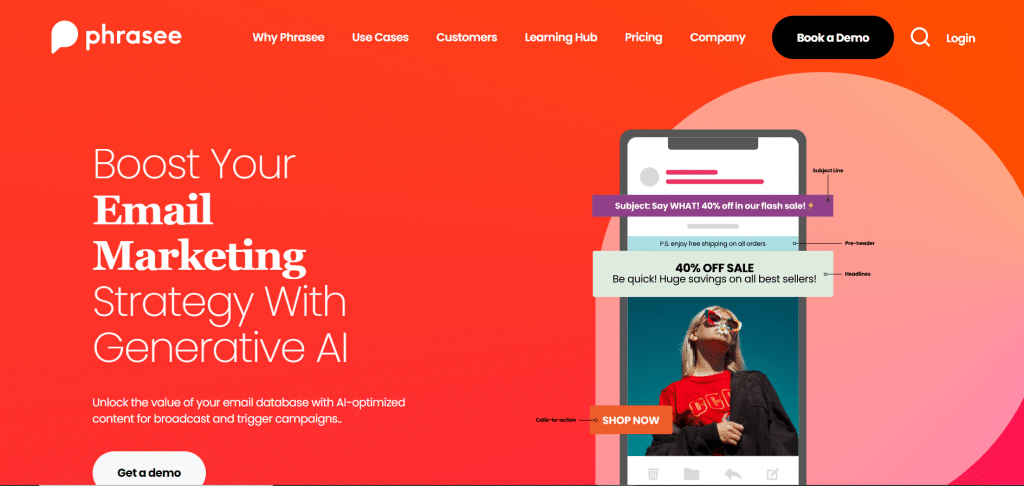
Phrasee has helped me analyze my brand voice and craft dynamic email content that feels like it’s written specifically for each recipient—greetings, recommendations, the whole package! This AI writing tool goes beyond basic personalization. Phrasee will help you predict which subject lines and CTAs will resonate with your audience, and it will even help you carry out A/B testing on different versions.
#2. Mailchimp
A list without Mailchimp is incomplete. Mailchimp’s AI tools have changed the way I use the service for years. Their “Predicted Demographics” tool uses AI to find out information about subscribers, such as their age, gender, and location. This email marketing tool lets me make ads that are very specific to each group of people and connect with them. Plus, Mailchimp’s simple design makes it simple for anyone to use AI to make emails more interesting and get better results. You should try this tool.
#3. HubSpot
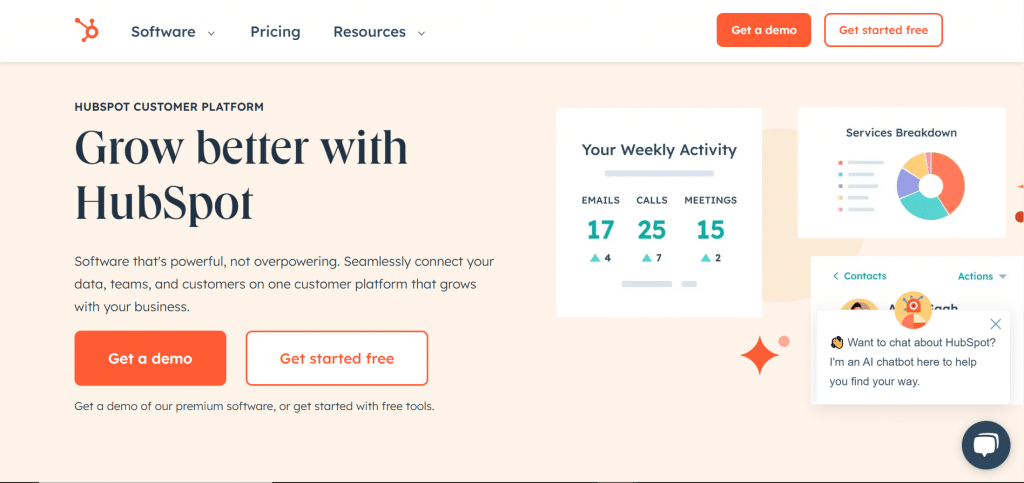
I believe everyone knows HubSpot. HubSpot is a strong marketing tool, but its email marketing AI features aren’t very helpful. It does A/B testing and some tuning based on demographics, but it can’t go as deep as some other AI tools.
The best thing about HubSpot for me is that it does everything. All in one place, I can handle my CRM, marketing automation, and even some simple AI email marketing. That keeps things simple and effective.
Furthermore, I can utilize HubSpot’s tailored and targeted email marketing campaigns to attract, retain, and satisfy customers. These programs improve my open, click-through, and sales by targeting the right individual at the right moment.
#4. Twilio SendGrid
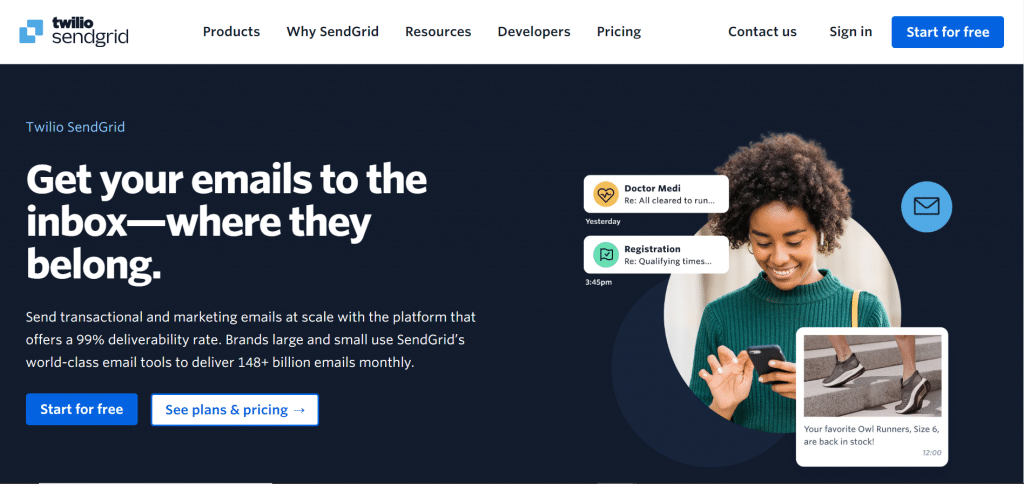
This is another robust AI email marketing software, you can use. Don’t let the lack of built-in AI fool you! SendGrid is a powerful email delivery platform that integrates seamlessly with many AI tools. With SendGrid, you can leverage the power of AI to create content, personalize, and optimize from other platforms while still utilizing SendGrid’s robust email-sending infrastructure and advanced deliverability features. This will ensure that your meticulously crafted AI-powered emails reach your subscribers’ inboxes.
SendGrid also offers its own AI features for send time optimization and engagement tracking, further boosting results. SendGrid’s email marketing tool is easy to use, and its powerful features make it a valuable asset in my email marketing arsenal.
#5. Seventh Sense
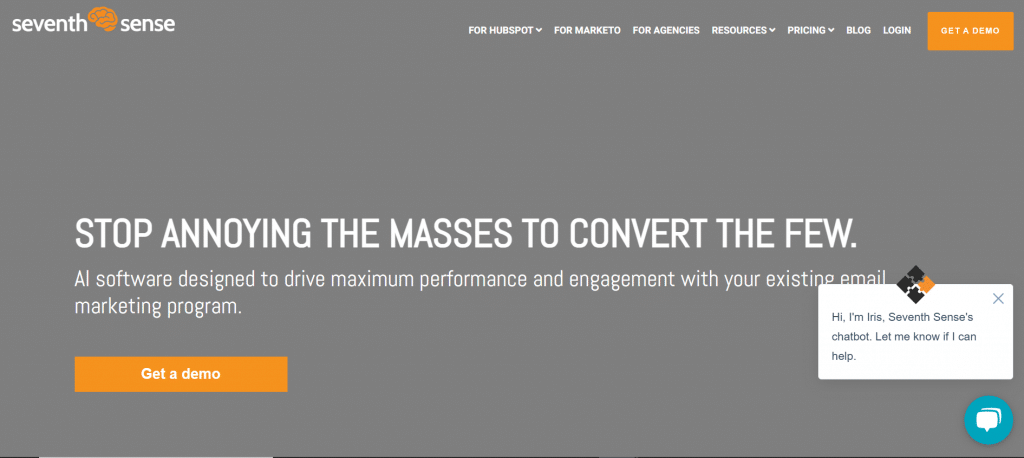
I find Seventh Sense to be valuable to me as an email marketer. Its email sequences can be customized for each prospect based on data and behavior, making them ideal for sales. This also makes potential customers much more interested, thereby helping you close more deals.
But Seventh Sense does more than just customize. It also uses smart AI to figure out when the best time is to send each email so that it gets the most response. This method, which is based on data, along with its easy integration with popular CRMs, has greatly improved my campaign’s open and click-through rates.
#6. Drift
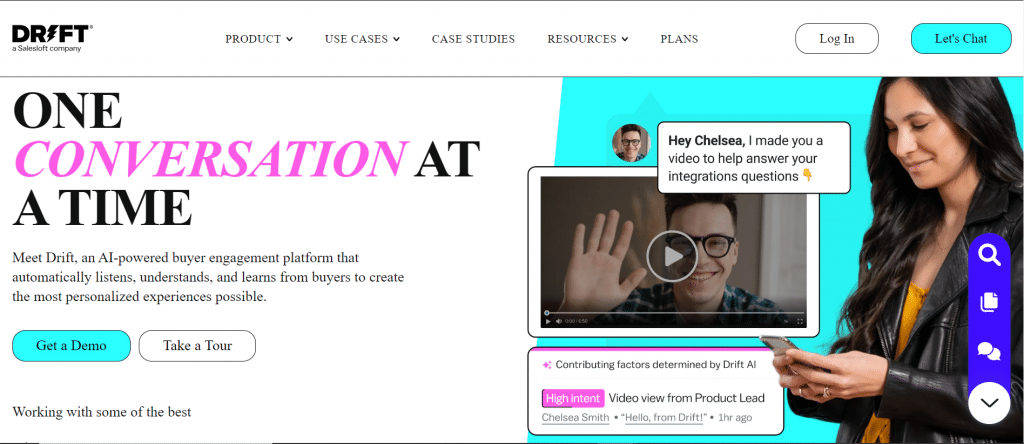
I know how important it is to keep leads interested before adding them to your email list. That’s the reason I have added Drift to this list. AI-powered chatbots greet their website visitors and then sort them into groups based on their hobbies and behaviors. This tool lets me send highly targeted email ads that are relevant to their needs, which will in turn get them involved right away. Drift also lets you record emails, set up sequences, and set up automatic follow-ups to keep in touch with leads and turn them into customers through email marketing. Thus, it is a great way to build connections and get things done.
#7. Omnisend
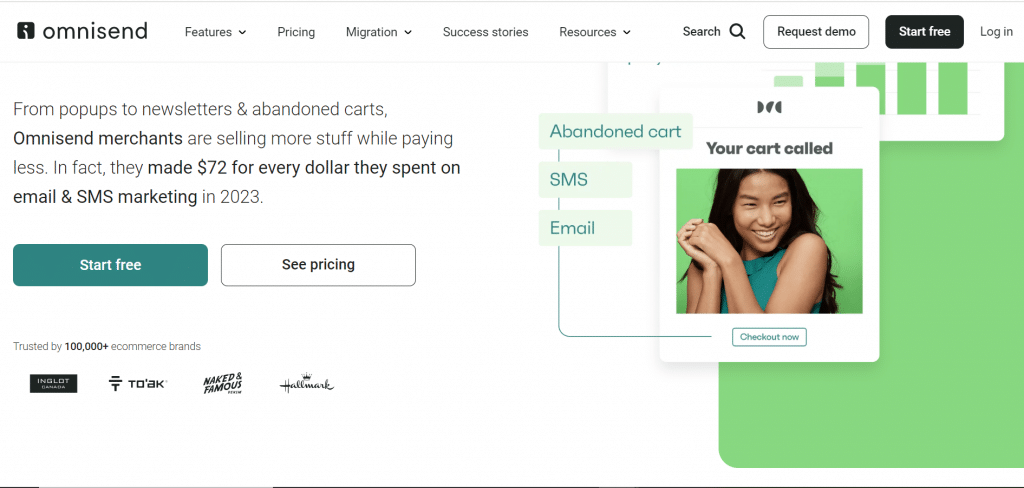
I’ve found that Omnisend has made a huge difference in my email marketing. This platform is more than just a mass email service; it uses AI to personalize texts sent through SMS and email, among other channels.
Predictive analytics and classification are two ways that Omnisend’s AI helps me learn more about my audience. After understanding my audience, I create ads that are specific to each customer and not just for large groups of people. Now, I no longer have to send a lot of emails that aren’t relevant; I can send texts at the right time based on what each customer wants to see.
#8. Brevo
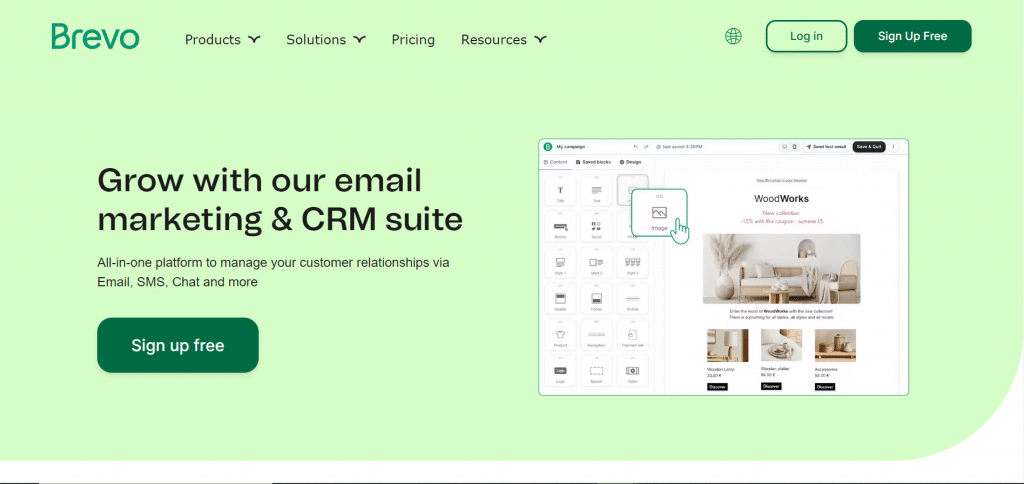
With Brevo, an AI-powered writing assistant, you can generate material, improve readability, and improve writing quality. Though it is not explicitly tailored for email marketing, it can refine email copy, enhance subject lines, and maintain messaging coherence. Using advanced algorithms, Brevo also analyzes text and suggests improvements in clarity, conciseness, and tone. Brevo provides actionable insights and recommendations to enhance email campaign effectiveness, refine messaging, boost engagement, and drive better results.
#9. customer.io
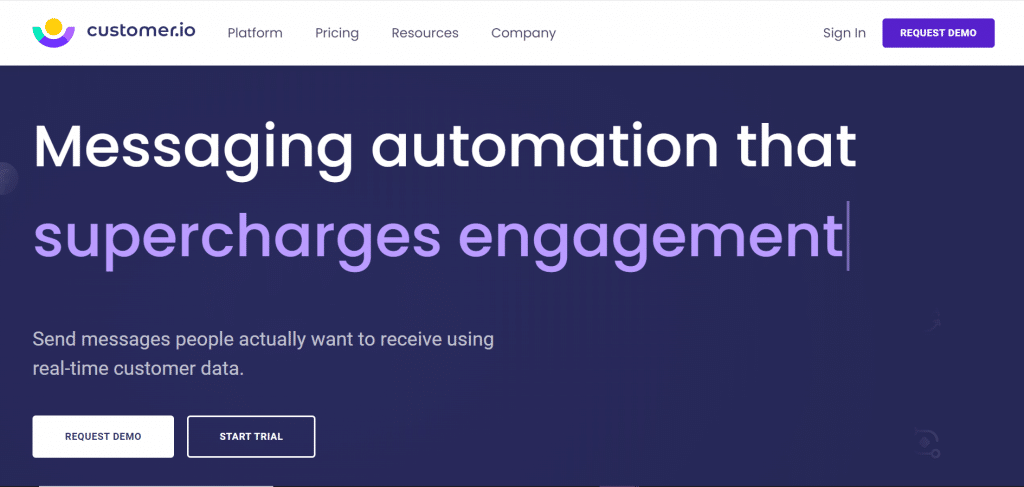
In my experience, AI email marketing platforms like Customer.io are game-changers. They use customer behavior data to craft personalized messages that resonate deeply. This goes beyond just names; I’m talking targeted recommendations, automated workflows based on actions, and A/B testing to optimize timing. The results are undeniable: higher open rates, clicks, and conversions—a marketer’s dream!
#10. GetResponse
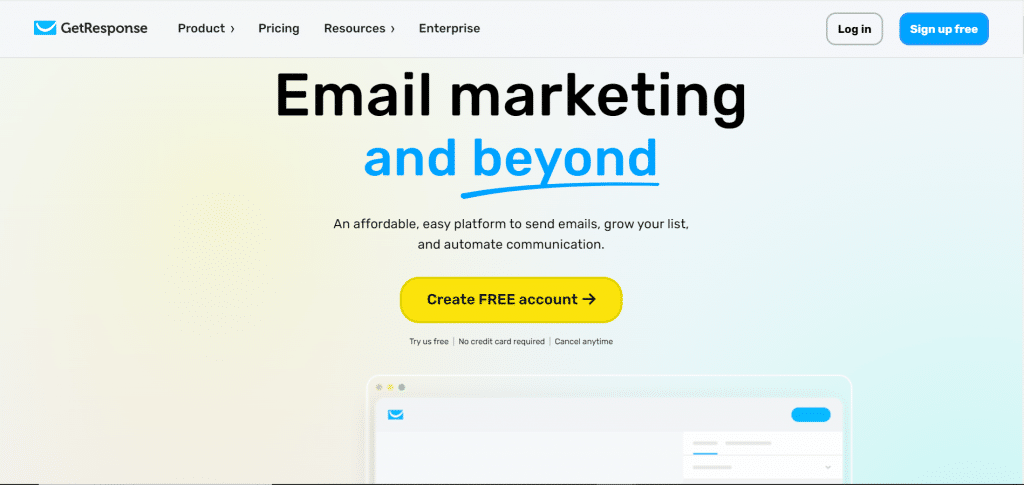
GetResponse is a wonderful tool for marketing beyond email, in my experience. AI streamlines tasks and improves results. I use their AI to customize material for subscribers, increasing engagement. It also automates mundane operations like sending emails at opportune times, letting me focus on strategy. I use GetResponse’s AI-powered analytics to maximize campaign ROI. It transforms email marketing.
Factors to Consider when Choosing AI Email Marketing Tools and Software
#1. Data Privacy and Compliance
Several laws guide companies that conduct business online, so before you choose an AI email marketing tool, review your business’s data privacy laws, such as GDPR, CCPA, and CAN-SPAM. Make sure that any AI email marketing solution you select follows these regulations to secure consumer data.
In addition, review the privacy policies and data handling practices of potential AI email marketing tools. Look for features such as data encryption, user consent management, and data access controls to ensure compliance. Additionally, establish internal protocols for handling and safeguarding customer data.
#2. Integration Capabilities
You should also assess your tech stack and identify email marketing, CRM, analytics, and other platforms and tools. AI email marketing tools that interact with these systems simplify data flow and process automation.
In addition, research the integration capabilities of potential tools and assess their compatibility with your existing platforms. Also, prioritize tools with pre-built integrations or comprehensive APIs for quick connectivity. Integration and data synchronization require strong collaboration with IT and marketing.
#3. Customization and Flexibility
As a business owner, you should also identify your unique business needs and preferences regarding email marketing workflows, segmentation strategies, and campaign rules. Look for AI email marketing tools that offer customizable features and flexible configurations to accommodate these requirements.
Then, explore the customization options available in potential tools, such as workflow builders, segmentation criteria, and rule-based automation. Test several setups to find the best one for your needs. Invite departmental stakeholders to provide comments and align with corporate goals.
#4. Training and Support
To assist your staff in using and maximizing the technology, prioritize tools with extensive training and responsive customer support. Look for tools with documentation, tutorials, webinars, and dedicated account managers. Create a training plan to introduce your team to the new tool and its features. Furthermore, establish mechanisms for reporting difficulties and contacting tool vendor support.
#5. Algorithm Transparency and Bias
Take proactive measures to understand how AI algorithms work and mitigate potential biases in your email marketing campaigns. Request transparency from potential tool vendors regarding their AI algorithms and data processing methods. Seek tools that offer explainability features, such as algorithmic transparency reports or bias detection mechanisms. Implement data validation and auditing processes to monitor for biases and ensure fair and accurate results.
#6. Localized and Multilingual Support
You should also understand the relevance of tailored and relevant content for varied consumers in several languages and geographies. Select AI email marketing platforms that provide localization and multilingual content.
This will enable you to tailor emails to specific audiences using dynamic content insertion, language targeting, and localized templates. You can also hire professional translators or multilingual staff to ensure accurate and culturally appropriate messages.
#7. Continuous improvement and Updates
Promote constant learning and optimization to keep your email marketing relevant. Choose AI email marketing tools that prioritize ongoing progress. Continue learning about AI technology and email marketing best practices via industry journals, conferences, and online groups.
#8. Cost and ROI Analysis
Carrying out a cost-benefit analysis can determine an AI email marketing tool’s value. Calculate tool ownership costs, including subscriptions, implementation, training, and maintenance. Also consider improved engagement, conversion rates, and efficiency advantages when calculating ROI. You should also conduct pilot tests or trials with selected tools to evaluate their performance and assess their impact on your bottom line before making a final decision.
What are the Limitations and Risks of AI Email Marketing?
Everything that has a good side also has a bad one, including AI email marketing. Overreliance on AI algorithms may reduce human oversight and innovation. Another concern is algorithmic biases, where AI algorithms mistakenly favor specific demographics or content categories, skewing outcomes.
We also know that AI email marketing systems require accurate and sufficient data to generate valuable insights. AI algorithms may make incorrect or irrelevant recommendations without effective data hygiene and management. Marketers must retain high-quality data and routinely analyze AI-generated content for relevance and efficacy.
AI’s a game-changer, but I tend to keep a watchful eye. To avoid over-reliance, I use AI for suggestions but maintain creative control. To mitigate bias, I also choose diverse data sets and monitor results to catch skewed targeting. Finally, clean data is key. I prioritize data hygiene and review all recommendations before sending, ensuring AI serves my campaigns, not the other way around. This balanced approach unlocks the power of AI while keeping the reins firmly in my hand
Other challenges include:
#1. Data Privacy Concerns
AI email marketing platforms access vast amounts of customer data, generating privacy and security concerns. To protect client data and create subscriber trust, ensure you use encryption, access controls, and GDPR and CCPA compliance.
#2. Integrating Complexities
Integrating AI email marketing solutions with existing platforms and processes is difficult and time-consuming. I advise you to use pre-built integrations or powerful APIs to simplify integration and ensure data flow.
#3. Technical Skills Gap
The marketing team may lack the technical skills to use AI email marketing technologies. As a business, ensure that resources are available to marketing team members to enable them to know about AI principles, tools, and best practices, and also offer workshops and online courses to develop technical abilities.
#4. Few Customization Options
Some AI email marketing software has limited customization possibilities, making it hard to adjust messages to corporate needs. You should prioritize tools with significant customization and communicate with providers to request more customization or custom solutions.
#5. Cost Considerations
Implementing AI email marketing tools may require a significant upfront investment, leading to concerns about cost-effectiveness. Assess AI-powered features’ worth using a cost-benefit analysis, flexible pricing structures, and aspects like enhanced engagement and long-term business impact.
How to Implement AI Tools in Your Email Marketing Strategies
AI integration into your email marketing platform is difficult, but worth it. Start by finding ways AI can increase workflow and engagement. Carefully choose equipment that fits your goals and budget. Remember that AI enhances your efforts, not replaces them. With the correct technique, AI-powered email marketing will pay off.
Balancing Data Management and Privacy
When using AI in email marketing, data management, and privacy must be prioritized. Always acquire explicit authorization before using recipients’ data for marketing, and gather and store data ethically and openly. Respecting your audience’s privacy builds trust and loyalty, leading to long-term connections.
Embrace AI Email Marketing Today!!
Just as AI is taking over everything, it’s always better to roll with the moving train, not to be left behind. Use the newest AI techniques and technology to build hyper-personalized, engaging email campaigns that engage with your audience. Everything, from personalized content to automated optimization, is possible.
So what are you waiting for? Embrace the power of AI and take your email marketing to new heights in 2024 and beyond!
Can AI be used in Email Marketing?
Yes, we are already using it. AI can be used in email marketing in a big way to personalize content, send emails at the best times, write better subject lines, manage segmentation, improve the customer experience, get people more involved, and increase return on investment (ROI).
Is There a Free AI Tool to Write Emails?
Yes, tools like Zapier, OpenAI’s GPT-3.5, and Phrasee Free offer limited free versions for AI-powered email writing, though their capabilities may be restricted compared to paid options.
Is Mailchimp an AI Tool?
Mailchimp incorporates AI tools, like “predicted demographics,” enhancing email personalization and campaign effectiveness. However, its AI capabilities are not as extensive as those of dedicated AI email marketing platforms.
How do I Create an AI Email?
AI-powered tools like Phrasee, Mailchimp, or SendGrid can be used to personalize content, find the best send times, and boost interest when making an AI email. Use predictive analytics, write catchy subject lines, and automate tasks to make AI-driven email marketing work well
What is AI Email Marketing?
AI email marketing is the process of using AI to improve email campaigns by personalizing content, sending emails at the best times, segmenting audiences into groups, and increasing involvement through predictive analytics and dynamic content, which leads to better results and a higher return on investment (ROI).
- Benefits of AI in HR
- PERSONALIZED MARKETING: Definition, Examples & How to Use It
- Customization Marketing: Definition, Concept, Types & Examples
- DANGERS OF AI: What Are the Risks of Artificial Intelligence (AI)?
- Affiliate Marketing Programs: A Comprehensive Guide to The Top Affiliate Marketing Programs






